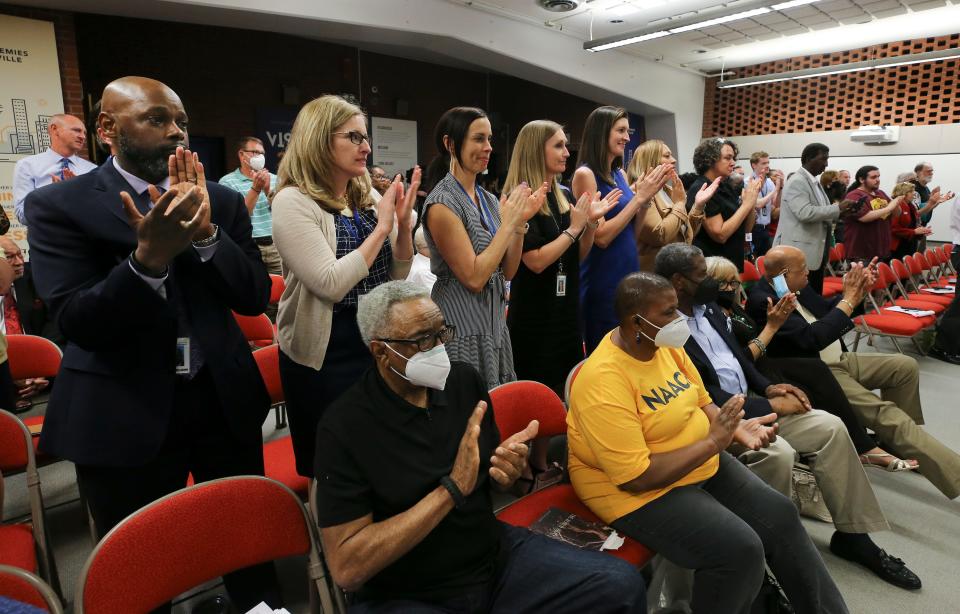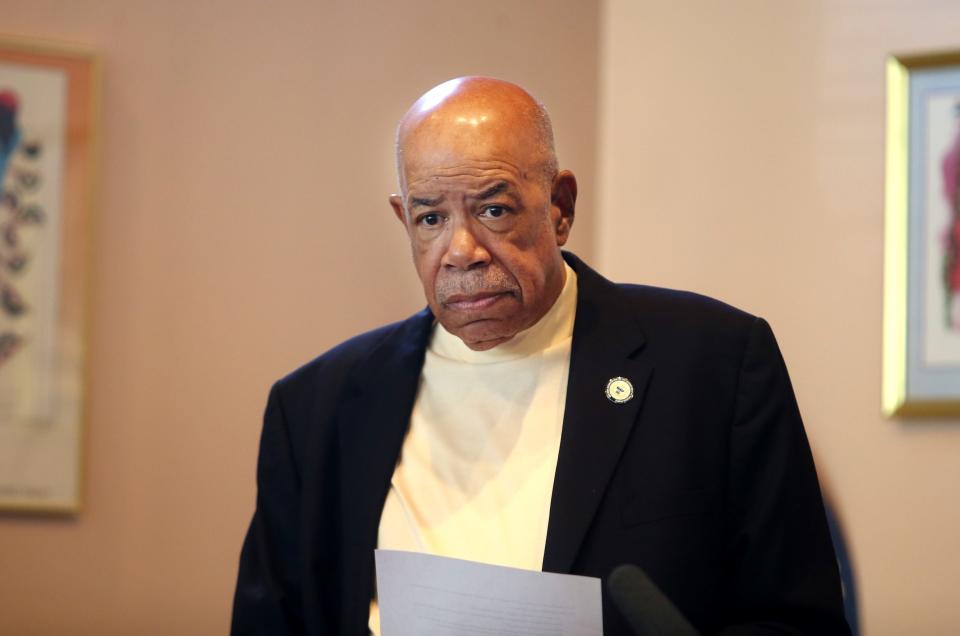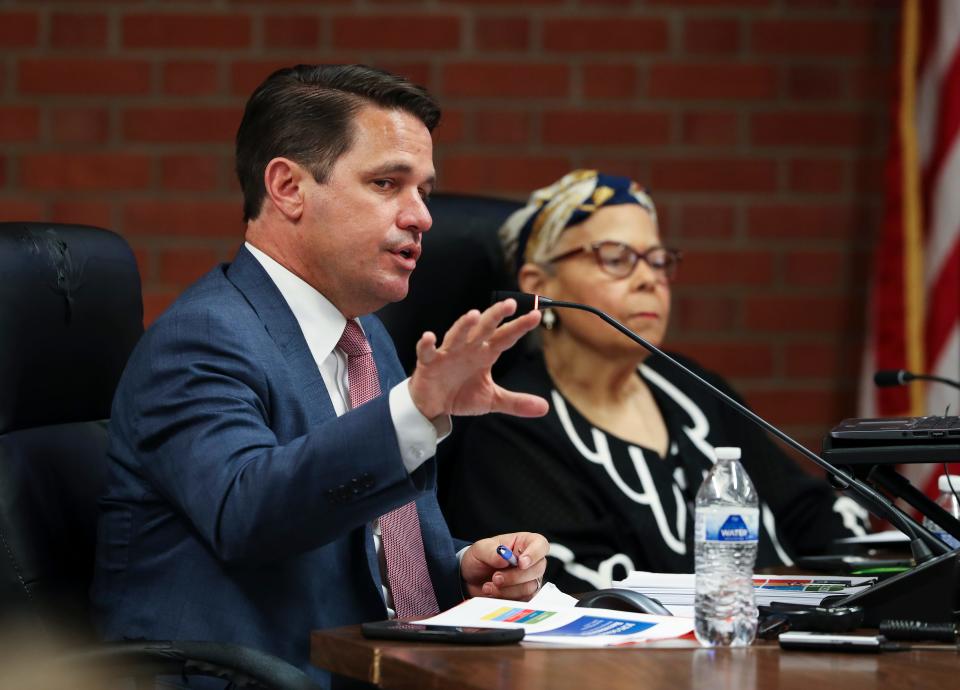In historic move, JCPS board votes to roll back busing program, overhaul magnets
LOUISVILLE, Ky. — Aspiring to rectify decades-old racial inequities, Jefferson County Public Schools approved sweeping reforms Wednesday of how it assigns students to school.
Jefferson County’s seven-member school board unanimously voted in favor of the district’s proposal, which has been in the works for nearly five years.
"Today can be a new beginning for JCPS. It can be a new beginning for Black children," board vice chairman Corrie Shull said. "And it can be a new beginning to rebuild trust."
"The stakes are really high," Shull continued. "I hope we don't let Black kids down."
The Last Stop: Louisville's troubled busing legacy may be nearing its end
Wednesday’s vote puts a nail in the coffin of what once was a countywide school integration effort started in the 1970s, effectively gutting the last remnant of the “busing” plan keeping schools more integrated than they would be otherwise.
Under the plan, students in Louisville’s West End — a predominantly Black and low-income area that's home to the only students in JCPS who are still assigned to schools far from home for diversity purposes — will be able to opt to stay closer to home for classes. They would still be able to pick a school elsewhere in the county, too.

Superintendent Marty Pollio has maintained the plan will bring a semblance of equity to a major district policy that has long had none.
Since the 1980s, students in the whiter and more affluent areas of Jefferson County have been allowed to attend schools near their homes, only venturing out by choice. Now, West End families will have the same option. District officials hope boosts in attendance, student belonging and family involvement come with it.
Interested in education? Subscribe to The Hall Pass, our education newsletter
"This is the most important vote that this board has taken in decades," Pollio told the board. "I do not believe it is the sole answer to the achievement gap. There are many things that we have to do. But this is a big step forward for this district."
While agreeing, some school board members, community leaders and retired educators fear a return to segregation.

Hours before the vote, the proposal received the conditional blessing of a coalition of retired Black educators and the Louisville branch of the NAACP, the latter of which pushed to integrate Louisville classrooms decades ago.
"Once we realized that 'dual resides' was another name for neighborhood schools, and that 'dual resides' of this plan would resegregate our schools, it was a dilemma," Raoul Cunningham, the president of Louisville's NAACP, said Wednesday afternoon.
Leaders soon realized the proposal would likely pass, Cunningham said. They shifted their focus to how they could push the plan to improve academic achievement for Black students — JCPS made several changes they requested — and ultimately supported "for the benefit of Black children not only today, but generations to come."
A long journey
Wednesday’s vote comes after twin Courier Journal investigations examined how JCPS’ nationally lauded “busing” plan and its sought-after magnet schools have often failed the very students they hoped to help.
It also follows decades of contention around busing in Louisville. The initial days of the school desegregation method in 1975 were met with riots.
Over the decades that followed, JCPS whittled down its busing program, with the Black community shouldering the burden of keeping schools integrated while their local options suffered.
Magnet schools, considered a way to naturally keep schools integrated, ended up creating a system of haves and have nots, with Black and low-income students often locked out of top schools.
"I was here as a teacher in 1975 when this began," board member Linda Duncan said before voting in favor of the plan. "I've watched the evolution of this plan, watched its evolution into something that was not serving our students from the West End as it originally was intended to do."
A district committee started to review the JCPS student assignment plan for potential changes in 2017, this time, with a focus on addressing racial inequities.
Then, in 2018, state education officials threatened a state takeover of JCPS.
Charters vs magnets: West Louisville kids at the center of dueling 'school choice' ideas
Among the main reasons for the takeover, then-interim Education Commissioner Wayne Lewis wrote at the time, was the “distinct, negative impact” JCPS’ student assignment plan was having on the district’s most vulnerable children, which he said included JCPS’ African American students.
When Lewis and the Jefferson County Board of Education reached a settlement avoiding a takeover in August 2018, JCPS agreed to reassess and revise its assignment plan.
That stipulation catalyzed the historical proposal approved by the board Wednesday night, which came after a series of iterations of the proposal and delayed votes.
Pollio told reporters he had been an "active complainer" about the district's assignment plan prior to the takeover attempt. While the settlement agreement required JCPS to change the plan, it didn't specify how big those changes needed to be.

The more Pollio dug into the plan and its history, he said, the more problems he found.
Lewis told Pollio that student outcomes needed to be the focus of any assignment changes, Pollio recounted Wednesday. Pollio agreed.
Milton Seymore, who was the state education board chairman when a takeover was recommended, said he felt vindicated.
“The statistics were not lying,” he said Wednesday afternoon. “The children were failing.”
Accountability will be key to the plan’s success, Seymore added.
“I hope and pray that everybody is on the wall watching,” he said. “Because if you don't, we'll be back.”
Academics and resources
While no major stakeholder groups opposed the proposal outright, concerns and hesitancy linger.
West End schools have already been rapidly resegregating over the past decade, a Courier Journal investigation found. The plan passed Wednesday is nearly guaranteed to intensify that trend, further ensuring West End students will land in a high-poverty, hyper-segregated school if they choose to stay close to home. And it offered no clear path to avoid furthering a growing divide in race and class in the county's schools.
In an attempt to counteract the heightened concentration of poverty and give West End families two strong school options, JCPS’ proposal includes an extra $12 million in funding each year for at least the next decade to be split between 13 schools in the West End.
The district will also build a middle school in the community. Pollio said they're closing in on a few potential sites for the new West End middle school, but noted sixth graders in the 2023-24 school year will be in a "swing" school.
Board members voted without knowing what kind of financial incentives JCPS will be able to offer to attract and keep educators in West End schools — a key point to not only overcome routine struggles with teacher vacancies, but to hire enough to reduce class sizes.
Negotiations between JCPS and the Jefferson County Teachers Association over extra compensation for West End teachers are ongoing. Pollio declined to confirm specifics referenced by community groups to reporters Wednesday night, but said he felt "very confident" in how conversations are going. He hopes to bring more information on teacher stipends or salary multipliers to the board on Tuesday.
Magnet schools will also see a slate of changes aimed at making access to some of the district’s most sought-after schools more equitable.
Schools will need to try to meet diversity targets to be more reflective of JCPS’ student population. Magnets will no longer be able to “exit,” or kick out, students. School application processes will be streamlined, with admissions lotteries moving from school control to central office.
Is your school affected? Some JCPS magnets expand while others end
Some magnet programs will be consolidated into one campus, while other programs will expand to become full-school magnets. Western High School will gradually become a full-school coding and IT magnet program. JCPS also agreed to replicate a popular elementary performing arts magnet school in the West End.
"It is the right thing to do; it is long overdue," Raymond Burse, with the NAACP, said Wednesday afternoon of the plan.
"And if we as a community are going to thrive, then we've got to make certain that every individual, every student in this community gets really — fully — educated."
Accountability and trust
Board chairwoman Diane Porter attended a segregated school in Louisville's West End before becoming a Jefferson County educator and, later, becoming the first Black woman to lead the district's school board.
"I've lived it," Porter said Wednesday night. "I don't have to read about about it. But it is important to me because this is public education."
Shortly before voting yes, Porter added: "There are consequences if we do not implement this plan for the benefit of our students."
JCPS must now implement the plan fully, several Black community leaders agreed, and be held accountable if they falter from what the NAACP called "a moral and contractual commitment to the community."
Pollio, who is white, understands.
"There has been a lack of trust in JCPS for many years, and I think you still feel that lack of trust in (the question of) are we going to follow through with what we promised," Pollio told reporters after the vote.
Showing the district's commitment to fully resourcing West End schools and focusing on academic achievement, at times codifying it in board policy, helped gain some of that trust, Pollio said.
In the years to come, following through on that commitment will be closely watched to see if Kentucky's largest district does right by its Black children, or, once again, does not.
"The devil is in the details," Shull said before casting his vote. "Implementation is what matters. We cannot drop the ball on this one."
Then, in honor of C. Mackey Daniels and Laken Cosby, who warned of a 1984 district policy change that placed the burden of school integration firmly on the shoulders of Black families, Shull voted yes.
"Cautiously," he said. "But, yes."
Staff writer Mandy McLaren contributed to this report.
Reach Olivia Krauth at okrauth@courierjournal.com and on Twitter at @oliviakrauth.
This article originally appeared on Louisville Courier Journal: JCPS board votes to roll back busing program, overhaul magnets

